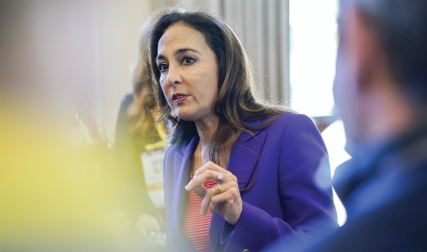Presidential Range
What a wonderful article on the process of finding a wonderful president [“Taking Charge,” Sept/Oct].
The very qualities that attracted the search committee to President Kim—his intellect, his commitment to worldly service, his engagement in the challenges of mind and body, his international stature in dealing with some of humanity’s most urgent issues—will distinguish Dartmouth during the next decades and provide us with leadership by example as well as by decision.
I teach and publish in the world of bioethics and healthcare. I have lectured, literally, from China to Scotland and points in between. I can only echo those who praise President Kim from within that arena. But, as your article makes clear, neither that arena nor any of the others he occupies, including race, defines him. Rather, he brings distinction across multiple sectors, and now to Dartmouth. We are very fortunate indeed.
It has been said that nations get the leaders they deserve. And so President Kim’s acceptance of the Dartmouth presidency is truly a measure of just how good we are. Congratulations to him and to us—and to DAM for a fine article.
Arthur B. LaFrance ’60
Portland, Oregon
It was not surprising to read in the Kim profile of the approach members of the board of trustees took to the presidential search.
At a time of global economic crisis, three members of the board have recently been nominated or named to positions in which they may help provide solutions to the problems our world faces: board chair Ed Haldeman ’70 as CEO of national mortgage lender Freddie Mac, Jose Fernandez ’77 as Assistant Secretary of State for Economic, Energy and Business Affairs, and Diana Taylor ’77 as an outside director of Citigroup to assist in overseeing its turnaround.
Their selection does more than draw attention to the quality of the trustees serving the College. It also underscores the importance of having a board composed of leaders who bring experience, worldliness and wisdom to its deliberations, as opposed to ideologues with a personal ax to grind.
Jonathan Low ’73
West Palm Beach, Florida
Having noted that only 19.5 percent of alums participated in this year’s Association of Alumni election, which resulted in the passing of an amendment to its constitution, I can’t help but feel that apathy, not democracy, won handily by all accounts.
I hope President Kim, with his credentials, will restore the morale we once had within this crucial segment of the Dartmouth family. Our new leader has a terrific opportunity and must succeed.
Donald E. Meads ’42
Elverson, Pennsylvania
Before I read Irene Wielawski’s fine article I, too, was skeptical and wondered about “How he was chosen. Why he took the job. How he will lead.” Now I know and I am reassured. What excitedly resonates with me is Dr. Kim’s statement: “We have to identify the areas of excellence at Dartmouth, but we also have to look at other campuses and capture their best ideas.”
Welcome to Dartmouth, sir!
Reed M. Badgley ’51
Chicago
Diplomatic Corps
Your Sept/Oct article about Josh Marcuse ’04 and his Young Professionals in Foreign Policy [“Their Future Is Now”] was of great interest to me. A year after graduating from Dartmouth I was commissioned into the Foreign Service and began a 31-year career with the Department of State, mostly on overseas assignments. Marcuse’s dedication and drive in promoting this organization is inspiring to those of us who have devoted our careers to diplomacy.
Michael G. Wygant ’58
Scarborough, Maine
Language Lesson
I enjoyed “Not Lost in Translation” [Sept/Oct], describing Professor Williamson’s course on the perils and difficulties of language translation. Anyone who has learned more than one language—even computer programming languages—realizes there is no simple one-to-one correspondence between the grammar, vocabulary or conceptual framework of different tongues.
Williamson could use our neighbors to the north as a simple but confounding example: License plates in Quebec bear the motto “Je me souviens,” three words that somehow convey all the pride and angst that is francophone Quebec yet defy accurate translation into English.
Carl Strathmeyer ’70
Lunenburg, Massachusetts
Dogged Pursuit
We knew a different Duke [“Royal Treatment,” Sept/Oct] in the Dartmouth of the mid-1950s—an iconic dog who taught us about life.
As undergraduates we pounded through each week so we could cut Saturday classes and proceed with our search of the girls’ circuit. No wandering searches for Duke. He stayed at home to satisfy his need for food and that other thing we all knew about.
Each day he headed to the Greaseliner Diner, where he outwitted the restaurateurs with his garbage-can tipping ability. No Commons menu for him.
One spring day, while lunching in Allen’s Drug Store, I noticed our hero snoozing in a corner in a spot of northern sun. Suddenly his pointed ears stood erect. He sprang to his feet and gave a snort. Across the slushy street, by the Inn, stood his duchess in the late afternoon glow. Never one to waste an opportunity, Duke lowered his right shoulder and, tucking in his ears while gritting his teeth, sped down the aisle and launched himself through Allen’s front window. Shedding shards of glass, he courted his duchess while unaffected by all around him, including Professor F. Cudworth Flint, DeOrmond “Tuss” McLaughry, football coach, and the hapless Capt. Goodreau, chief of police.
An independent and romantic example in those days of lockstep convention, Duke never looked back.
Jose Mesics ’54
Healdsburg, California
Deep Appreciation
Congratulations on your July/Aug issue. I especially enjoyed “In Too Deep” by Peter Heller ’82 but cannot get my mind around the awful ocean degradation he and Sylvia Earle, whose book he cited, describe.
Invading Iraq in pursuit of a failed energy policy is a radical action. At least the radical action of Sea Shepherd is in pursuit of a winning policy: conservation of the sea supported by international law.
Fred Chase ’53
Waukegan, Illinois
It gladdened me—but didn’t at all surprise me—to see in the senior survey [“Campus,” July/Aug] that 57 percent of the class of 2009 consider themselves more environmentally conscious after their time at Dartmouth. Two other pieces in the same issue—“The Skipper,” about sailing instructor Anthony Sandberg ’71, and Heller’s story about extreme environmental activism—further prove the point that Dartmouth excels at producing environmental thinkers and leaders.
Knowing that there are many knowledgeable and passionate grads out there who care about these issues is partly why a small group of young alums is working to improve opportunities for eco-minded alumni to network with each other. We encourage interested alumni to check out our new Web site : www.dartmouthgreenalumni.org.
Ruth Hupart ’08
Washington, D.C.
More on MacGovern
The $63,500 cited in the profile about him [“Who is John MacGovern?” July/Aug] is hardly a “modest salary” for what MacGovern does for a living—and apparently running the Hanover Institute is how he does, in fact, earn his living.
MacGovern’s Form 990 nonprofit tax filings claim he spends 40 hours per week running the Hanover Institute. Hard to imagine, but who are we to question a sworn statement to the IRS?
MacGovern has a vested financial interest in remaining at odds with the administration—and urging fellow alums to continue sending him checks to fuel “the cause.” (This helps explain why he declined an alumni governance task force invitation a few years ago to discuss a new alumni constitution and contribute his suggestions.)
There have been other independent alumni organizations in recent decades aimed at “educating” Dartmouth alumni: the Hopkins Institute, Dartmouth Alumni for Open Governance, Dartmouth Alumni for Common Sense and, most recently, Dartmouth Undying. Whether you agree or disagree with the views espoused by those groups, you can rest assured not a single alumnus or alumna involved ever took a single penny for their services. Whatever their goals, personal financial interest was clearly not a motivating factor. Can the same be said for MacGovern?
Jim Adler ’60
Norwich, Vermont
It is very telling that Frank Gado ’58 [“Letters,” Sept/Oct] does not identify himself as one of the executive committee members who supported the lawsuit brought by the Association of Alumni (AoA) against the College. Yet he claims, “The executive committee made certain the conduct of the suit would lie solely with it [the suit-supporting majority of the executive committee]” and not with the rest of the committee.
Gado uses John MacGovern ’80, who sourced conservative PAC money aimed at recovering conservative political and conservative social influence over academia, to evade acknowledg-ment of the imperial decision of the majority of the executive committee. When you need something questionable accomplished, you outsource the job to preserve your innocence and the “legality” of the action. The denial of this procedural hubris is an intellectual and moral embarrassment. And it is anti-democratic.
The executive committee and thus the AoA it leads was taken over by Gado’s cabal, which was responsive to a minority of alumni and denied its obligations to the majority—the entire alumni body, which constitutes the AoA membership.
That none of the members of the executive committee who supported the suit was re-elected shows that a greater number of AoA members had enough intelligence to see through the guise and throw the bums out.
Jim Ruxin ’70
Los Angeles
Rethinking Reunions
The trouble with having all classes invited to reunions every year [“Time for a Bigger Tent, July/Aug] is that there is no compelling reason for those years closest to you to attend that year as there is with the clusters.
I happily trekked 6,000 miles to see old friends from WDCR and The Dartmouth for my fifth, 10th, 15th and 20th. Although I agree the 25th and 50th should stand alone, I have not yet nor will I attend future solo-year reunions. There’s just not enough bang for the buck, as it were. Plus we combined events and benefited from economy of scale.
Mark Stitham ’72
Kailua, Hawaii




